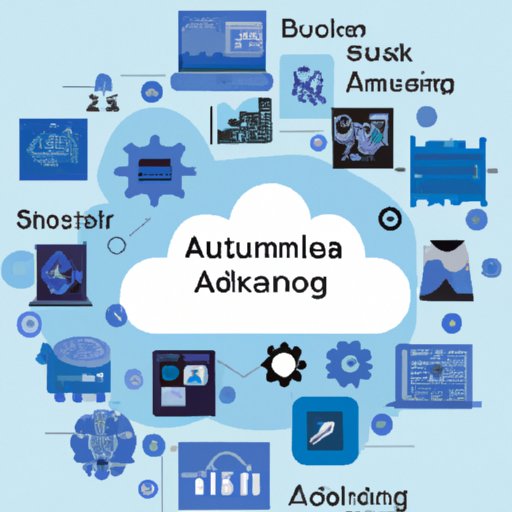Introduction
Technology has revolutionized the way businesses operate. In the past decade, technological advances have enabled businesses to become more efficient and better connected with their customers. From automation to online shopping, communication technology to cloud computing, big data analytics to social media, and artificial intelligence, technology has transformed the way businesses work and interact with their customers.

Automation and its Impact on Business Efficiency
Automation is the process of using machines and software to complete tasks that would otherwise be done manually. Automation has been a major driver of efficiency for businesses in recent years, allowing them to reduce costs and increase productivity. According to a study by McKinsey & Company, companies that embrace automation can see a 20-25% reduction in costs and a 30-35% improvement in productivity.
The benefits of automation for businesses are clear: it can help reduce costs, increase productivity, and improve accuracy. However, there are some challenges associated with automation, such as the need for significant upfront investments in technology and training, as well as the potential for job losses due to automation. It is important for businesses to weigh the pros and cons of automation carefully before implementing it.
The Rise of Online Shopping and Its Effects on Brick-and-Mortar Stores
Online shopping has become increasingly popular in recent years, with shoppers attracted to the convenience and ease of use of the digital platform. According to the US Department of Commerce, e-commerce sales in the US reached $601 billion in 2018, accounting for 10.9% of all retail sales in the country. This figure is expected to continue to grow in the coming years.
Online shopping has many benefits for consumers, such as the ability to compare prices quickly and easily, access to a wide range of products, and the convenience of home delivery. However, this shift to online shopping has had a negative impact on brick-and-mortar stores, which are struggling to compete with the low prices and convenience of online retailers.
Communication Technology and How It Has Improved Business Connectivity
Communication technology has made it easier for businesses to stay connected with customers and colleagues. With the advancement of mobile technology and the proliferation of social media platforms, businesses now have more ways to reach out to their customers, build relationships, and promote their products and services.
The benefits of communication technology for businesses are clear: it can help to improve customer service, foster collaboration between teams, and increase visibility. However, there are also some challenges associated with communication technology, such as the need to ensure security and privacy, and the potential for information overload.

Cloud Computing: Its Benefits and Challenges for Businesses
Cloud computing is a technology that allows businesses to store and access data and applications on remote servers. This can provide businesses with increased flexibility and scalability, as well as cost savings. According to a survey by RightScale, 94% of organizations are already using cloud computing in some form.
The benefits of cloud computing for businesses are clear: it can help to increase efficiency, reduce costs, and enable remote working. However, there are also some challenges associated with cloud computing, such as security concerns and potential downtime.
Big Data Analytics and Its Role in Business Decision Making
Big data analytics is the process of collecting and analyzing large amounts of data to identify patterns and trends. This can be used to inform business decisions and strategies. According to a study by McKinsey Global Institute, up to $3 trillion in value could be created annually through the use of big data analytics.
The benefits of big data analytics for businesses are clear: it can help to improve decision making, increase efficiency, and gain insights into customer behavior. However, there are also some challenges associated with big data analytics, such as the need for specialized skills and the potential for data breaches.
Social Media and Its Influence on Business Marketing Strategies
Social media has become an integral part of modern life, and businesses are now using it to reach out to their customers and promote their products and services. According to a survey by Sprout Social, 93% of marketers say they use social media for business purposes.
The benefits of social media for businesses are clear: it can help to increase visibility, build relationships with customers, and drive sales. However, there are also some challenges associated with social media, such as the need for constant engagement and the potential for negative feedback.

Artificial Intelligence and Its Uses in Business Automation
Artificial intelligence (AI) is the science of creating computer systems that can learn and make decisions on their own. AI has a wide range of applications in business, from automating mundane tasks to providing insights into customer behavior. According to a survey by PWC, 72% of business leaders believe AI will significantly change the way they do business.
The benefits of AI for businesses are clear: it can help to automate processes, increase efficiency, and provide insights into customer behavior. However, there are also some challenges associated with AI, such as the need for specialized skills and the potential for ethical issues.
Conclusion
In conclusion, technology has transformed the way businesses operate in the past decade. From automation to online shopping, communication technology to cloud computing, big data analytics to social media, and artificial intelligence, technology has enabled businesses to become more efficient and better connected with their customers. As technology continues to evolve, businesses must remain aware of the opportunities and challenges presented by these advances.
(Note: Is this article not meeting your expectations? Do you have knowledge or insights to share? Unlock new opportunities and expand your reach by joining our authors team. Click Registration to join us and share your expertise with our readers.)
